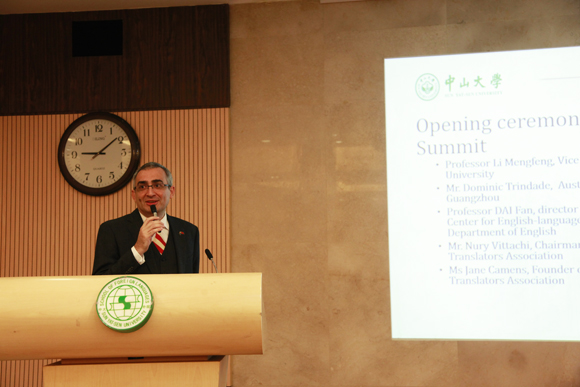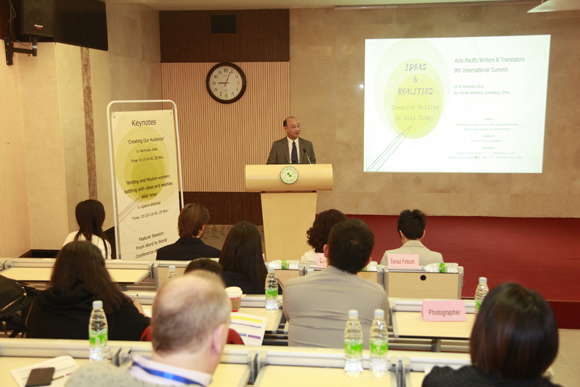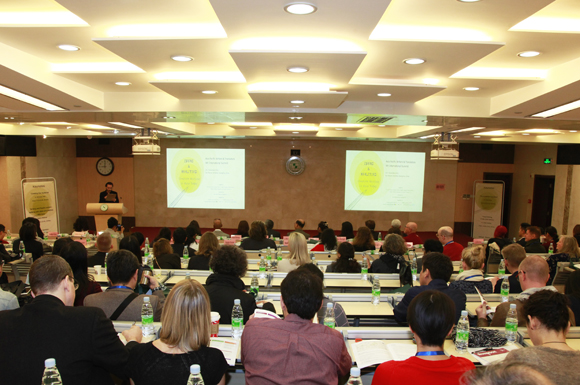2016 Asia Pacific Writers and Translators 9th International Summit “Ideas & Realities: Creative Writing in Asia Today” held at SYSU
Source: School of Foreign Languages
Written by: Eliza Vitri Handayani
Edited by: Wang Dongmei
Recently, the 2016 Asia Pacific Writers and Translators (APWT) 9th International Summit, held at the School of Foreign Languages of Sun Yat-sen University (SYSU), featured "Ideas & Realities: Creative Writing in Asia Today".

Mr. Dominic Trindade, Consul-General of the Australian Consulate-General Guangzhou, delivering a speech
Dominic Trindade, Consul-General of the Australian Consulate-General Guangzhou; Nury Vittachi, chair of APWT; Li Mengfeng, Vice President of SYSU; Xu Dongli, Party Secretary of School of Foreign Languages (FLS) of SYSU; Dai Fan, Chair of Department of English of FLS and Director of the SYSU Center for English-language Creative Writing, attended the opening ceremony.

Prof. Li Mengfeng, Vice President of SYSU, delivering a speech
The summit was opened by Li Mengfeng, who has been a great source of support for the creative writing in English as a foreign language. Then, Dai Fan, who has been the driving force for teaching creative writing in English as a foreign language in China, welcomed all participants to the summit.

The opening ceremony
Nury Vittachi shared encouraging statistics on the growing impacts Asian creative industry has had on the world: “For movies, audience size in Asia has surpassed that in the West. Currently the number one Intellectual Property in the world is from Asia: Pokemonx.”
The need for more diverse representations of Asians and how to increase literary exchange within the Asia Pacific region and with the rest of the world were two of important focuses of the summit. Participants came from all over Asia, Australia, the US, and Europe, sharing the passion for literature and for getting to know stories told in the Asia Pacific region and the people writing them. In addition to panel discussions, the summit also offered workshops in translation, travel writing, editing, and poetry writing.
Launching her collection of short stories Portable Curiosities, Julie Koh read an intriguing story about a yellow man leaping out of a movie screen and becoming an expert in Italian neo-realist cinema, but people keep seeing him primarily as a yellow man. The story, among other things, is a sharp and funny comment on race relations in Australia.
In her keynote speech, novelist and scriptwriter Qaisra Shahraz talked about the hurdles women had to overcome to write and to be respected as writers—in the past and in the present. “Inequality relating to women is a running theme in my literary works,” she said, "I want women to have access to quality education, I want them empowered.”
Qaisra also talked about how Muslim women are constantly stereotyped in the media and about her work to counter those stereotypes. "Each Muslim woman is a product of her culture, her circumstances, and her mind,” she said. “Not all of us are passive or oppressed or can be bullied about what we must do or what we cannot do. We can speak for ourselves.”
The discussion on women telling their own stories continued in the panels Women Writing Asia and Indonesian Literatures. Author Maribel Kawsek spoke about writing the lives of Chinese-Filipinos, who are still invisible in the Philippines. When asked about what women are writing about in Indonesia, novelist Eliza Vitri Handayani reminded the audience that there are no limits on what women can write, and the challenge isn’t finding a subject to write about, but claiming space, fighting for equal opportunities, and getting wider audiences and appreciation not only from women readers.
The concern of being trivialized was also voiced in the panel Writing for Young Adults. Christopher Raja, author of The Burning Elephant, talked about initially being embarrassed and disappointed that his novel was marketed as a YA novel, but he was happy with how the book has been received. Author Jane Houng said that writing for young people meant writers had to explore what it means to be young—the challenges of finding yourself, going through your first love, experimenting with new things.
The panel Little Fish, Big Ponds: Hooking an International Publisher brought together Neeta Gupta—publisher of Yatra Books and curator of Jaipur BookMark, Rachel Edwards—editor of Transportation Press, Alexandra Büchler from Literary Across Frontiers (LAF), and David Lopez-del Amo, a European literary agent based in China.
Neeta works to encourage and promote translation of international books into Indian languages and Indian books into other Indian languages. Like in India, literature in Europe is written in many languages—some more well-known than others. Alexandra said that LAF’s work has been guided by the principle of reciprocity—getting writers writing in “bigger” languages and markets translated into "smaller” languages and markets, and use the opportunity to also translate and promote writers writing in the “smaller” languages into the “bigger” languages.
In his keynote speech, Nicholas Jose asked what it meant when Asia Pacific writers and translators get together at events such as APWT conferences. “What we engage here is not something defined simply by geography, language, ancestry, or ethnic background, but something creative—forms and practice and expression that is special and valuable.” He noted a new level of awareness of creative writing in the region, and an increase in the teaching of creative writing and the acknowledgment of the role of translators.
Another highlight of the conference was a panel with Chinese authors from different generations talking about the subjects that mattered to them and their writing life. Participants were treated with fantastic performances and readings by Joshua Ip, Omar Musa, Osamah Sami, Sally Breen, other summit participants and Guangzhou’s spoken word poets.
Also of note was Robin Hemley’s keynote speech on traveling and the responsibility of travel writers. He mused on the concepts of nationalism and patriotism, about the stories he picked up along the way and the stories he wrote for audiences beyond the places he visited, and how traveling had pushed him to self-interrogation, questioning preconceptions, and asking difficult questions about himself and others.
This year's conference was the first one held in China. It brought many writers to Sun Yat-sen University, to the city of Guangzhou. They not only came to know creative writing in China and in Asia, but also got to know something about Guangzhou, about China.